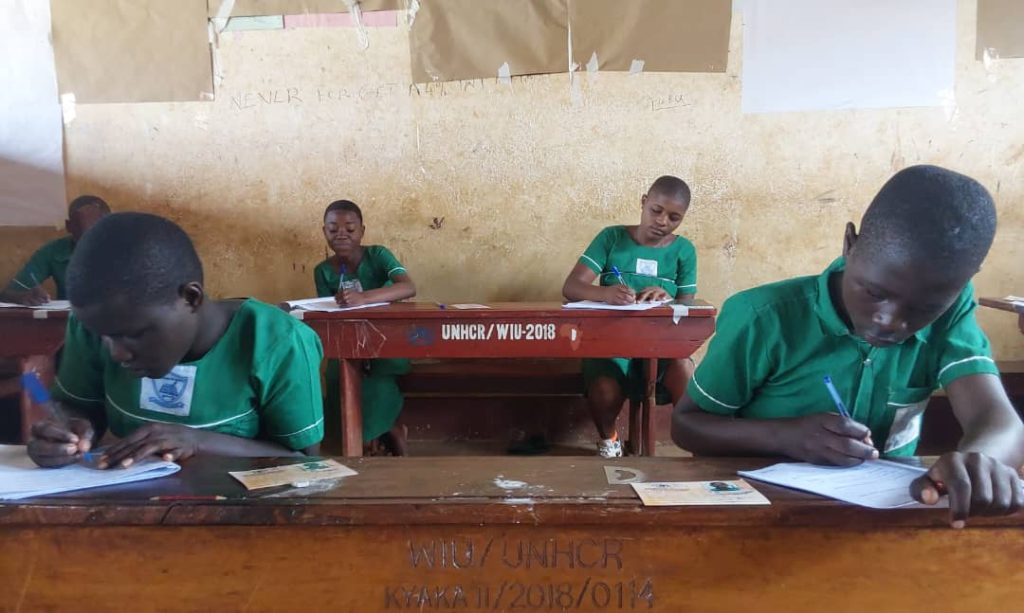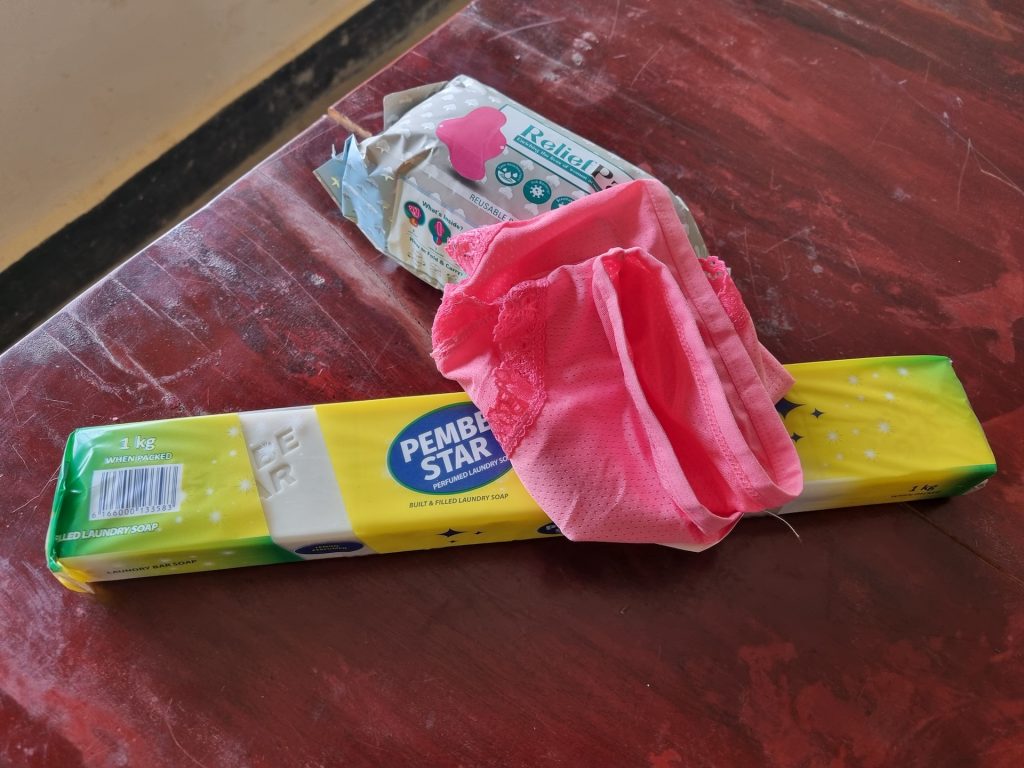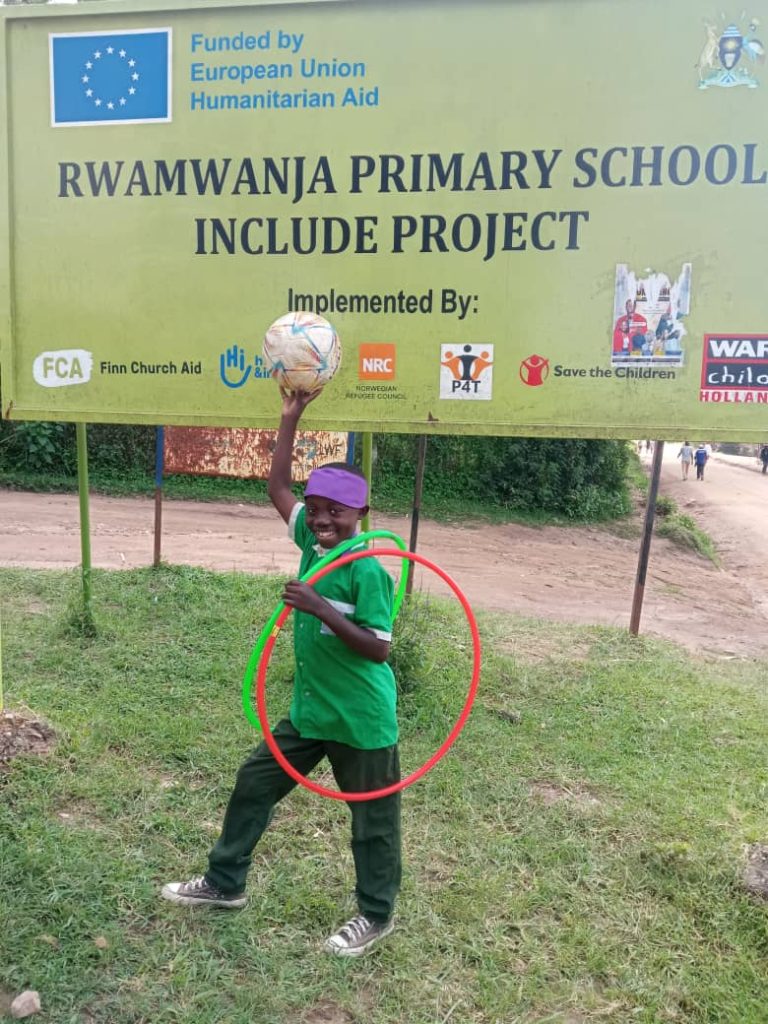Support from all sides for refugee schoolchildren, thanks to the EU-funded INCLUDE project
Education access, menstrual hygiene management, and psychosocial support are critical factors shaping the lives of young girls and boys in refugee settlements. Funded by European Union Humanitarian Aid, FCA is addressing these challenges in Rwamwanja and Kyaka II refugee settlements in Uganda through its INCLUDE project.
BY OFFERING accelerated education programmes, menstrual hygiene management sessions, support programmes through play, and financial aid for education, the INCLUDE project is creating opportunities for refugee and host community children to thrive academically and socially.
Money was a barrier to education for Rinah
Rinah Chambikwa, a 17-year-old student in primary seven at Byabakora Primary School defied the odds to continue her education, thanks to the support from the Cash for Education programme within the INCLUDE Project.
She is the eldest of seven children in a single-parent family. Her life took a turn when political instability forced her family to flee from their home in Bukavu, Democratic Republic of Congo, to Uganda in 2019.
“My father disappeared during the war, and we don’t know where he is or if he is still alive,” Rinah tells us.
Upon arriving in Kyaka II refugee settlement, Rinah and her siblings faced numerous challenges, especially financial ones. They couldn’t enroll in school due to a lack of money. With her mother supporting their large family, Rinah stepped up to help by engaging in income-generating activities to provide for their daily needs.
In 2020, her younger siblings were enrolled in Byabakora Primary School, but Rinah, being older, had to wait until they got more money.

Financial support helped Rinah concentrate on her studies
In 2022, during an FCA back to school campaign, Rinah’s mother learned about the Accelerated Education Programme (AEP) — a scheme designed to help older children like Rinah re-enter the education system with a curriculum tailored to their needs. She also learned that the programme would provide financial support for her children’s education.
Rinah’s mother reached out to FCA staff, and they supported her in enrolling Rinah in school.
Back in Congo, Rinah was in the second year of secondary school, but because of the language barrier, she struggled to continue her education at the same level in Uganda. Her school advised her to go to a lower level, in a primary school.
“I couldn’t understand English, so I was placed in a lower class to keep up with the other students. At first, I wasn’t comfortable with it, but I was told that the Accelerated Education Programme would help me catch up to my agemates quickly,” Rinah says.
That year, Rinah, along with two of her siblings, were selected for the Cash for Education programme. They were given money to cover their school fees, buy scholastic materials, and cover other essential costs like food. Rinah was able to focus on her studies without the constant worry of financial strain.
“I don’t know where I would be if AEP and Cash for Education support were not in place. Maybe my mother would have married me off. This project has given me hope of a better tomorrow,” she adds.
Now, as a candidate for the Primary Leaving Examination (PLE), Rinah is determined to complete her primary education and continue her journey to secondary school. Her dream is to become a doctor, so she can give back to her community.
Menstrual Hygiene Management keeps girls in school
Teacher Atuhaire Rita, a Senior Teacher at Mahani Primary School in Rwamwanja Refugee Settlement, says she has witnessed how menstrual hygiene challenges, combined with deep-rooted taboos and myths about menstruation, have negatively impacted girls’ education.
“In a community where menstruation is often a taboo subject, girls face significant barriers in managing their periods with dignity and privacy, which severely affects their confidence and academic performance,” she says.
However, everything began to change when FCA, through its INCLUDE project, introduced menstrual hygiene management sessions in the school.

The initiative has equipped teachers with essential training on menstrual hygiene and sexual and reproductive health rights. With the training, they have been able to extend the knowledge to both boys and girls at Mahani Primary School, addressing the misconceptions and negative cultural beliefs that have historically surrounded menstruation.
Additionally, girls are trained on how to make their own disposable pads, providing them with a sustainable and proper alternative for managing their menstrual hygiene. This empowerment has helped break the myths and taboos surrounding menstruation, fostering a more supportive and understanding school environment.
“This initiative has transformed the learning environment and provided much-needed relief and dignity for the students. Thanks to the project, girls now receive sanitary kits that enable them to manage their menstruation with ease and privacy,” Ms Rita adds.

“Many girls were using makeshift materials like toilet paper, old cloths, or even banana leaves. These practices not only gave them infections but also contributed to the stigma that menstruating girls faced as they leaked. The provision of sanitary kits has changed this,” she explains.
Building confidence through the Team Up programme
Fidele Serukato, a 12-year-old Congolese refugee, enrolled in Primary Three at Rwamwanja Primary School, faced numerous challenges before joining the Team Up programme. Living in a refugee settlement, his family struggled financially, and the trauma from his experiences in Congo made adapting to life in Uganda especially difficult.

“I felt very alone and had no friends,” Fidele recalls. “I often got into fights at school because I didn’t know how to express myself,” he says.
Everything changed for Fidele when he became part of Team Up. The programme introduced him to a variety of fun and engaging games, sports, and activities, all led by supportive mentors who encouraged him to step out of his comfort zone.
Initially hesitant to join, Fidele was soon captivated by the excitement of the games and dances. He quickly discovered that he could have fun while simultaneously learning valuable life skills.
“At first, I didn’t want to join, but the games and dances were so much fun,” Fidele says. “I learned that I could enjoy myself and learn important things at the same time.”
As Fidele became more involved in the Team Up programme, his social connections flourished as he engaged more with classmates and peers, fostering a stronger sense of community. His attendance improved, and he became increasingly active and engaged in class. As his academic performance improved, his attitude also shifted significantly. Fidele became friendlier, more cooperative, appreciating teamwork, positive behaviour, and the power of mutual support.
“I started making friends and felt like I was part of a community,” Fidele shares. “My grades got better, and I became more active in class. I learned how to work with others and be positive.”
Funded by the European Union Humanitarian Aid (ECHO), the INnovative and inCLUsive accelerated eDucation programmE for refugee and host community children (INCLUDE) project is implemented by Finn Church Aid (FCA) in collaboration with Save the Children, Norwegian Refugee Council, Humanity and Inclusion, and War Child Holland. It is designed to address challenges to education for refugees and host communities, including newly arrived and out of school children in primary and secondary schools in Kyangwali, Kyaka, Nakivale and Rwamwanja Refugee Settlements.
Text: Linda Kabuzire
Pictures: FCA Uganda